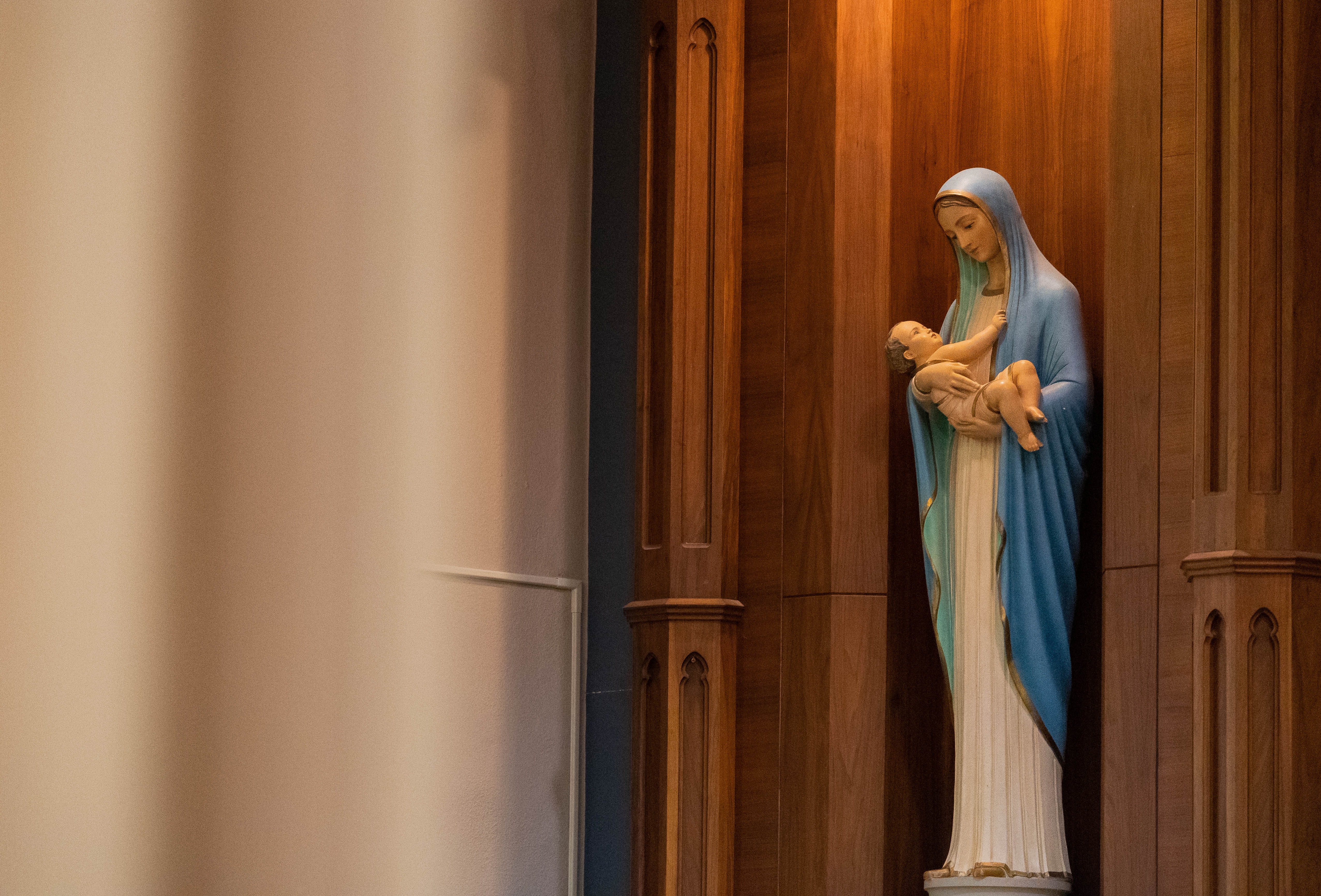The Church is very strategic in its placement of the readings throughout the year. Today’s second reading is a perfect example of this when Paul talks about stewardship. It’s no surprise that we hear about this on the Feast of the Epiphany when we commemorate the magi finding the baby Jesus and bringing him gifts of Gold, Frankincense, and Myrrh. I always thought this was funny because these seem like terrible gifts for a little baby, but maybe this whole story is meant to show us more about what to do with gifts as opposed to what the actual gifts are.
I want to take a moment today to reflect on Adam’s roles in the garden of priest, prophet, and king and how these relate to stewardship today. First, in Genesis 1:26 we hear that Adam has dominion over the things in the garden. Just like a king, he is meant to care for the things that are given to him. I am reminded of that scene from The Lion King where Mufasa tells Simba that everything the light touches belongs to him. But it is not his to rule over as a tyrant, but rather to care for as a faithful servant. It is the same for us today. We have all been given things that we are meant to care for and treasure.
Second, in Genesis 2:15 Adam is told to work and to guard in the garden. These two words (“work” and “guard”) only occur together in the rest of the Old Testament in relation to the priestly roles in Leviticus. It is clear that Adam is given a priestly role here, but what is the primary role of a priest? Quite simply, it is to make the commonplace holy. That is what a priest does at Mass when simple bread and wine transform into the body, blood, soul, and divinity of Jesus. So too, our role on earth is to bring the light of Christ to all corners of the globe, using our gifts to light the world with God’s love.
Third, in Genesis 2:19-20 we hear God giving authority to Adam to name the animals. In other words, God is giving power to Adam’s words that whatever he calls the animals, that shall be their name. A prophet is one who speaks with authority. We have been given authority to use our gifts to proclaim the Good News. Through our baptism, we are called as priest, prophet, and king, to enter into the world and offer our gifts and lives as a living sacrifice.
This is a lot to think and pray about, but maybe on this Feast of the Epiphany we can just reflect on two main points: Am I being a good steward of the gifts God has given me? And, when I offer these gifts back to God, is he pleased with them?
From all of us here at Diocesan, God bless!
La Iglesia es muy estratégica en la ubicación de las lecturas durante todo el año. La segunda lectura de hoy es un ejemplo perfecto de esto cuando Pablo habla de la administración de los bienes. No debe sorprendernos escuchar de esto en la Fiesta de la Epifanía, cuando conmemoramos a los magos que encontraron al niño Jesús y le llevaron regalos de oro, incienso y mirra. Siempre pensaba que era chistoso porque parecen regalos horribles para un bebé pequeño, pero tal vez toda esta historia esté destinada a mostrarnos más sobre qué hacer con los regalos en lugar de cuáles son los regalos.
Quiero tomarme un momento hoy para reflexionar sobre los roles de Adán en el jardín de sacerdote, profeta y rey y cómo se relacionan con la administración de los bienes hoy. Primero, en Génesis 1,26 escuchamos que Adán tiene dominio sobre las cosas del jardín. Al igual que un rey, debe cuidar las cosas que le han sido otorgadas. Me recuerda a esa escena de El Rey León donde Mufasa le dice a Simba que todo lo que toca la luz le pertenece. Pero no le corresponde a él gobernar como un tirano, sino más bien cuidarlo como un servidor fiel. A nosotros nos pasa lo mismo hoy. A todos se nos han dado cosas que debemos cuidar y atesorar.
En segundo lugar, en Génesis 2,15 se le dice a Adán que trabaje y cuide el jardín. Estas dos palabras (“trabajar” y “cuidar”) sólo aparecen juntas en el resto del Antiguo Testamento en relación con las funciones sacerdotales en Levítico. Está claro que aquí a Adán se le da un papel sacerdotal, pero ¿cuál es el papel principal de un sacerdote? Sencillamente, se trata de santificar lo común. Eso es lo que hace un sacerdote en la Misa cuando el simple pan y el vino se transforman en el cuerpo, la sangre, el alma y la divinidad de Jesús. Así también, nuestro papel en la tierra es llevar la luz de Cristo a todos los rincones del mundo, utilizando nuestros dones para iluminar el mundo con el amor de Dios.
En tercer lugar, en Génesis 2,19-20 escuchamos a Dios dándole autoridad a Adán para nombrar a los animales. En otras palabras, Dios está dando poder a las palabras de Adán de que como llame a los animales, ese será su nombre. Un profeta es aquel que habla con autoridad. Se nos ha dado autoridad para usar nuestros dones para proclamar la Buena Nueva. A través de nuestro bautismo, somos llamados como sacerdote, profeta y rey, a entrar al mundo y ofrecer nuestros dones y vidas como sacrificio vivo.
Hay mucho en qué pensar y orar, pero tal vez en esta Fiesta de la Epifanía podamos reflexionar sobre dos puntos principales: ¿Estoy siendo un buen administrador de los dones que Dios me ha dado? Y, cuando le ofrezco estos regalos a Dios, ¿está satisfecho con ellos?
De parte de todos nosotros aquí en Diocesano, ¡Dios los bendiga!

Tommy Shultz is a Business Development Representative for Diocesan. In this role he is committed to bringing the best software to dioceses and parishes while helping them evangelize on the digital continent. Tommy has worked in various diocese and parish roles since his graduation from Franciscan University with a Theology degree. He hopes to use his skills in evangelization, marketing, and communications, to serve the Church and bring the Good News to all. His favorite quote comes from St. John Paul II, who said, “A person is an entity of a sort to which the only proper and adequate way to relate is love.”
Feature Image Credit: OMELI PODCAST, unsplash.com/photos/n3lco3AMn8g




 Sr. Mary Martha Moss, FSP has had the grace of serving the Lord for over 40 years as a Daughter of St. Paul. Joyfully engaged in the community’s media ministry, she has authored 3 children’s books, presented on various topics for adult faith formation, enjoyed running Online Book Studies, served as a Pauline Book & Media Center manager and continues singing the alto part with the Daughters of St. Paul Concert Choir.
Sr. Mary Martha Moss, FSP has had the grace of serving the Lord for over 40 years as a Daughter of St. Paul. Joyfully engaged in the community’s media ministry, she has authored 3 children’s books, presented on various topics for adult faith formation, enjoyed running Online Book Studies, served as a Pauline Book & Media Center manager and continues singing the alto part with the Daughters of St. Paul Concert Choir.
 Tami Urcia grew up in Western Michigan, a middle child in a large Catholic family. She spent early young adulthood as a missionary in Mexico, studying theology and philosophy, then worked and traveled extensively before finishing her Bachelor’s Degree in Western Kentucky. She loves tackling projects, finding fun ways to keep her little ones occupied, quiet conversation with the hubby and finding unique ways to love. She works full time, is a guest blogger on
Tami Urcia grew up in Western Michigan, a middle child in a large Catholic family. She spent early young adulthood as a missionary in Mexico, studying theology and philosophy, then worked and traveled extensively before finishing her Bachelor’s Degree in Western Kentucky. She loves tackling projects, finding fun ways to keep her little ones occupied, quiet conversation with the hubby and finding unique ways to love. She works full time, is a guest blogger on 
 Kathryn Mulderink, MA, is married to Robert, Station Manager for Holy Family Radio. Together they have seven children (including Father Rob), and seven grandchildren. She is President of the local community of Secular Discalced Carmelites and has published five books and many articles. Over the last 30 years, she has worked as a teacher, headmistress, catechist, Pastoral Associate, and DRE, and as a writer and voice talent for Catholic Radio. Currently, she serves the Church by writing and speaking, and by collaborating with various parishes and to lead others to encounter Christ and engage their faith. Her website is
Kathryn Mulderink, MA, is married to Robert, Station Manager for Holy Family Radio. Together they have seven children (including Father Rob), and seven grandchildren. She is President of the local community of Secular Discalced Carmelites and has published five books and many articles. Over the last 30 years, she has worked as a teacher, headmistress, catechist, Pastoral Associate, and DRE, and as a writer and voice talent for Catholic Radio. Currently, she serves the Church by writing and speaking, and by collaborating with various parishes and to lead others to encounter Christ and engage their faith. Her website is 


 Deanna G. Bartalini, M.Ed.; M.P.A., is a certified spiritual director, writer, speaker and content creator. The
Deanna G. Bartalini, M.Ed.; M.P.A., is a certified spiritual director, writer, speaker and content creator. The 
 Dr. Alexis Dallara-Marsh is a board-certified neurologist who practices in Bergen County, NJ. She is a wife to her best friend, Akeem, and a mother of two little ones on Earth and two others in heaven above.
Dr. Alexis Dallara-Marsh is a board-certified neurologist who practices in Bergen County, NJ. She is a wife to her best friend, Akeem, and a mother of two little ones on Earth and two others in heaven above.
 Kate Taliaferro is an Air Force wife and mother. She is blessed to be able to homeschool, bake bread and fold endless piles of laundry. When not planning a school day, writing a blog post or cooking pasta, Kate can be found curled up with a book or working with some kind of fiber craft. Kate blogs at
Kate Taliaferro is an Air Force wife and mother. She is blessed to be able to homeschool, bake bread and fold endless piles of laundry. When not planning a school day, writing a blog post or cooking pasta, Kate can be found curled up with a book or working with some kind of fiber craft. Kate blogs at 
 David Dashiell is a freelance author and editor in Nashville, Tennessee. He has a master’s degree in theology from Franciscan University, and is the editor of the anthology
David Dashiell is a freelance author and editor in Nashville, Tennessee. He has a master’s degree in theology from Franciscan University, and is the editor of the anthology 
 Deacon Dan Schneider is a retired general manager of industrial distributors. He and his wife Vicki have been married for over 50 years. They are the parents of eight children and thirty grandchildren. He has a degree in Family Life Education from Spring Arbor University. He was ordained a Permanent Deacon in 2002. He has a passion for working with engaged and married couples and his main ministry has been preparing couples for marriage.
Deacon Dan Schneider is a retired general manager of industrial distributors. He and his wife Vicki have been married for over 50 years. They are the parents of eight children and thirty grandchildren. He has a degree in Family Life Education from Spring Arbor University. He was ordained a Permanent Deacon in 2002. He has a passion for working with engaged and married couples and his main ministry has been preparing couples for marriage.
 Merridith Frediani loves words and is delighted by good sentences. She also loves Lake Michigan, dahlias, the first sip of hot coffee in the morning, millennials, and playing Sheepshead with her husband and three kids. She writes for Catholic Mom, Diocesan.com, and her local Catholic Herald. Her first book Draw Close to Jesus: A Woman’s Guide to Adoration is available at Our Sunday Visitor and Amazon. You can learn more at
Merridith Frediani loves words and is delighted by good sentences. She also loves Lake Michigan, dahlias, the first sip of hot coffee in the morning, millennials, and playing Sheepshead with her husband and three kids. She writes for Catholic Mom, Diocesan.com, and her local Catholic Herald. Her first book Draw Close to Jesus: A Woman’s Guide to Adoration is available at Our Sunday Visitor and Amazon. You can learn more at 